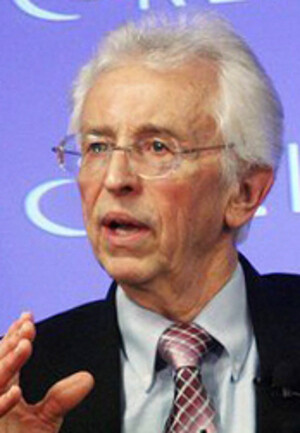hankyoreh
Links to other country sites 다른 나라 사이트 링크
Expert says Seoul and Washington’s emphasis on NK denuclearization has failed

By Kang Tae-ho, senior staff writer
One of the US’s best known experts on North Korea’s nuclear program says Washington and Seoul’s policies on containing the threat need to focus on a broader range of issues.
Siegfried Hecker said on Feb. 5 that the policies to combat the nuclear threat need to focus on the economy, education, resources, culture, and exchange in order to be effective.
He advocated a broader approach in response to North Korea’s imminent third nuclear test, rather than the hard line currently coming from the United Nations Security Council, with its emphasis on military actions such as preemptive strikes and a stronger naval blockade.
Hecker, who first glimpsed North Korea’s large-scale, modernized uranium enrichment facilities during a visit in November 2010, made the remarks at an international symposium in Seoul on the future of Northeast Asia.
Describing North Korea’s nuclear capabilities as still at a beginning level, he also warned of a possible worst-case scenario if the administrations of Barack Obama and Park Geun-hye did not develop policies geared to contain the threat the country’s nuclear program poses.
Hecker is a former director of the Los Alamos National Laboratory, one of the four major state-run atomic research institutes in the US. He was critical of Seoul and Washington’s emphasis on North Korea’s denuclearization since the second nuclear crisis of 2002, which he said had failed at preventing the country from strengthening its nuclear program.
The symposium, jointly organized by Yonhap News and the Shorenstein Asia-Pacific Research Center (APARC) at Stanford University, saw a number of people calling for a new approach to the issue beyond the traditional policies of engagement and isolation.
Former US secretary of defense William Perry, who played a crucial role in the development a joint communique between Washington and Pyongyang while serving as a North Korea policy adviser around the time of the inter-Korean summit talks in 2000, said formal dialogue was needed to supplement the informal talks held over the past few years. In particular, he said Washington needed to be bolder with its use of the “carrot” and the “stick” if it resumes dialogue with Pyongyang.
David Straub, associate director of APARC’s Korean Studies Program, called for an approach that would trigger internal changes in North Korean society. Predicting that an engagement approach from the Park administration would be supported by Washington and Beijing, he said there could be a major breakthrough within the year if the Kim Jong-un regime opts for reform and makes it clear that it intends to cooperate with Seoul.
Sung Kim, the US ambassador to South Korea, gave a welcoming address at the symposium in which he urged North Korea to stop its provocations and work together toward the common goal of denuclearization as a responsible neighbor. He also hinted at the possibility for negotiations, saying Obama planned to continue cooperating closely with Seoul as it addressed the North Korea issue.
Perry expressed concerns about the effects of a third nuclear test, saying that while it would not be a point of no return, it would also make dialogue between Pyongyang and Washington more difficult. At the same time, he also voiced strong opposition to the idea of a preemptive strike, which has been floated by some observers.
Perry, who once considered a preventive surgical strike on North Korea’s Yongbyon nuclear facilities while serving as secretary of defense in 1994 when the reopening of conflict on the peninsula seemed possible, said “The country’s nuclear capabilities were all concentrated in that one place at the time. That approach would not be effective today, since it is unclear where North Korea’s nuclear facilities are located.”
Please direct questions or comments to [english@hani.co.kr]

Editorial・opinion
![[Column] Park Geun-hye déjà vu in Yoon Suk-yeol [Column] Park Geun-hye déjà vu in Yoon Suk-yeol](https://flexible.img.hani.co.kr/flexible/normal/500/300/imgdb/original/2024/0424/651713945113788.jpg) [Column] Park Geun-hye déjà vu in Yoon Suk-yeol
[Column] Park Geun-hye déjà vu in Yoon Suk-yeol![[Editorial] New weight of N. Korea’s nuclear threats makes dialogue all the more urgent [Editorial] New weight of N. Korea’s nuclear threats makes dialogue all the more urgent](https://flexible.img.hani.co.kr/flexible/normal/500/300/imgdb/original/2024/0424/7317139454662664.jpg) [Editorial] New weight of N. Korea’s nuclear threats makes dialogue all the more urgent
[Editorial] New weight of N. Korea’s nuclear threats makes dialogue all the more urgent- [Guest essay] The real reason Korea’s new right wants to dub Rhee a founding father
- [Column] ‘Choson’: Is it time we start referring to N. Korea in its own terms?
- [Editorial] Japan’s rewriting of history with Korea has gone too far
- [Column] The president’s questionable capacity for dialogue
- [Column] Are chaebol firms just pizza pies for families to divvy up as they please?
- [Column] Has Korea, too, crossed the Rubicon on China?
- [Correspondent’s column] In Japan’s alliance with US, echoes of its past alliances with UK
- [Editorial] Does Yoon think the Korean public is wrong?
Most viewed articles
- 1‘We must say no’: Seoul defense chief on Korean, USFK involvement in hypothetical Taiwan crisis
- 2[Reportage] On US campuses, student risk arrest as they call for divestment from Israel
- 3[Column] Park Geun-hye déjà vu in Yoon Suk-yeol
- 4‘Weddingflation’ breaks the bank for Korean couples-to-be
- 5Korea sees more deaths than births for 52nd consecutive month in February
- 6N. Korean delegation’s trip to Iran shows how Pyongyang is leveraging ties with Moscow
- 7Amnesty notes ‘erosion’ of freedom of expression in Korea in annual human rights report
- 8Will NewJeans end up collateral damage in internal feud at K-pop juggernaut Hybe?
- 9N. Korean hackers breached 10 defense contractors in South for months, police say
- 10[Guest essay] The real reason Korea’s new right wants to dub Rhee a founding father